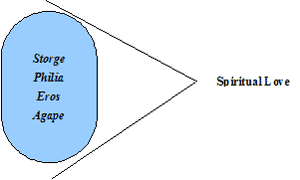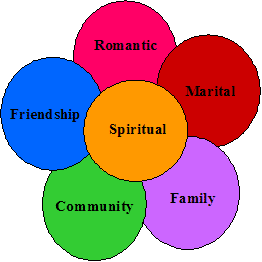The Six Loves
Sunday, February 12, 2006
A tribute to all lovers out there this Valentines' Day...
Note: This is something I wrote for
Candle!, the original article can be found
here.
How many loves are there in our lives? Some may say only one while others may claim to have as many as the number of people they love?
According to C. S. Lewis’s
The Four Loves (1960), there are four categories of love based on the four Greek words for love:
Affection (storge) is fondness through familiarity, which would include love between family members or people who find themselves together by chance.
Friendship (philia) is a strong bond existing between people who share a common interest or activity, not just mere companionship.
Eros is love in the sense of ‘being in love’, but is nevertheless distinct from sexuality (venus) since eros is an indifferent appreciation of the beloved as opposed to any sexual pleasure obtained from them.
Charity (agape) is love towards one’s neighbour which does not depend on any loveable qualities that the object of love possesses. This is exactly as Jesus says: “Thou shalt love thy neighbour as thyself” (Matthew 22:39)
Lewis’s exploration of love from a Christian perspective is thus completed in the four loves. Why then the Six Loves? I assure you firmly that it is neither inspired by the film, My Six Loves (Gower Champion, 1963) nor by ancient Tarot six faces of love.
What are the Six Loves?
Instead, according to Craig Owen’s The Six Faces of Love (2000), there are six loves, namely, Friendship, Romantic, Spiritual, Community, Marital and Family, which resemble an expansion of Lewis’s four loves as each of Owen’s six loves can be mapped onto one or more categories of storge, philia, eros and agape. For instance, Friendship, Community, Marital, Family and even Romantic love can be mapped onto storge, Friendship onto philia, and Romantic, Marital and perhaps Spiritual love onto Eros. Lastly, all the six loves except Spiritual love can be mapped onto agape, which Lewis sees as a specific Christian virtue, and that there is a need to subordinate the other loves to the love of God (Spiritual love). Thus, Lewis’s four loves can be interpreted as secondary to Spiritual love because the love of God encompasses all others, as can be seen from the diagram:

Unlike Lewis’s pre-assumption of the Spiritual love in each of us, Owen includes Spiritual love as one of the loves, thus ending up with six and not four loves. Nevertheless, Owen too recognises that Spiritual love is the most important of all the six loves. Although each love is distinct in its own respect, the six loves are bonded closely by Spiritual love, which is a requisite in order to appreciate the other five others. Once you understand the nature of Spiritual love, you can experience all the other loves in a fulfilling way. Therefore, Owen’s diagram would probably look something like this, since all the loves are closely connected and Spiritual love being at the centre of it all:

Before I delve into why Spiritual love is essential for understanding the other loves, I would like to take you to consider something most essential to our main subject: the definition of love.
What is this thing called “Love”?
Yes, what is Love exactly? How do we define this word that we all recognise and this feeling that we all experience all the time but can’t know for sure if “we’re actually in love” and can’t put a finger on it?
Owen’s definition is that “Love is a choice to be committed, vulnerable and responsible to the one for whom you care.”
Indeed, love is a choice, a decision we make, out of our own free will, which God bestows on us, that is, we can still choose to love Him or not.
Love is also a commitment, a belief in the person you choose and an acceptance of his/her strengths and imperfections. It also encompasses an affirmation for the person you love: “I believe in who you can become.” When we love God, we believe in his unconditional love for us and place our faith in him, for “Love… believes all things.” (1 Corinthians 13:7)
Love is a risky business because being vulnerable in it means that we accept the joy and happiness of love together with the pain and struggle that comes with it. When we commit to believing in someone, the disappointments that come with loving imperfect people are inevitable. Thus exposing oneself to the hurt that is bound to come with love makes us vulnerable, yet we love because of the happiness that outweighs the pain and because “Love… is not resentful…[and] endures all things.” (1 Corinthians 13:5-7)
However, making a decision to love and sticking firmly to our choice is to be responsible, and this means that we are accountable to and for the one we love. It also means that there is no shortcut in loving someone and in the activities that involve love, for example, trusting one another, being honest with each other, and communicating (not just talking) with each other. For instance, we cannot make a second-rate decision to love God by only saying that we do and not putting in effort to trust in Him or communicate with Him.
The Spiritual Love and its relationship with the other Five Loves According to Owen, the nourishment of the soul must be satisfied by spiritual love so that we do not commit the mistake of expecting another love, most commonly the romantic love, to fulfil the double duty of undertaking both the spiritual and romantic loves. If we search for that one true love that would give us a sense of purpose, a feeling of being connected to the world in a positive and meaning way, we would be committing the mistake of expecting a romantic love relationship to fill an emptiness in our lives. While a romantic love relationship creates a shared sense of self and identity, he adds that, although closely related, it is essentially different from our transformation of the self, which is the primary focus of spiritual love. Thus we should not expect another love to satiate our own selfish needs (such as our spiritual needs) because “Love… is not self-seeking.” (1 Corinthians 13:5)
In spiritual love, the transformation of the self is one that involves the learning and practice of values that God encompasses, such as compassion, mercy and kindness. As such, we should aim to have all our different kinds of love relationships tempered by these values, for instance, by approaching our friendships with compassion or our romantic love relationships with kindness, because only then can we find a sense of purpose and a feeling of being connected to the world in a positive way in our lives. And in understanding who we truly are and in loving ourselves, we can then love our neighbours as Jesus did.
4:37 pm
クロサギ


